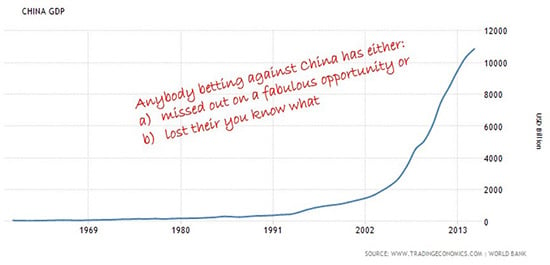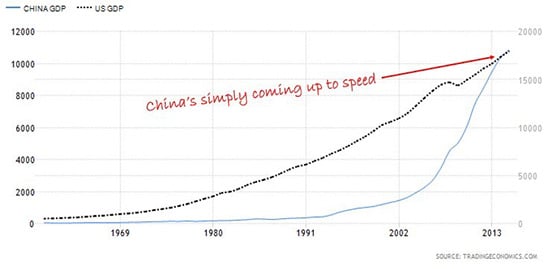Policy insiders and political apparatchiks were aghast when Trump took a congratulatory call from Taiwanese President Tsai Ing-wen, then tweeted about it. And they couldn't wait to explain the "gaffe."
Only it wasn't a gaffe at all.
What Trump did was brilliant and potentially very, very profitable.
Here's what everybody is missing.
China Bears Still Have It Wrong
No doubt you've seen the headlines.
To hear the mainstream media tell it, President-elect Donald Trump is hell-bent on starting a trade war:
- "In China-U.S. Trade War, Trump Would have Weapons" - The New York Times
- "Election of Donald Trump Foreshadows Trade War in Asia" - Defend Democracy Press
- "Trump's Vow to Target China's Currency Could Be First Step to Trade War" - The Wall Street Journal
Oh, really?
Speaking to Taiwan's president last Friday was a move of "bottomless pig-ignorance," according to an anonymous liberal foreign policy commentator cited in The Chicago Tribune. Others were far less generous.
Think about this for a second.
Most people who believe Trump is off the rails are Washington insiders with huge vested interests to protect on both sides of the aisle. Very few of 'em have ever visited China, let alone spent decades in global markets.
China bears have called for a total collapse every year there for the last 40 years.
Admittedly, their arguments are alluring and certainly sound convincing.
I know because I hear investors all over the world parrot them... China can't succeed because it's Communist, because China doesn't have free markets, because China doesn't have an advanced legal system, because there are ghost cities, nonperforming loans, the data's cooked... yada, yada, yada.
I really feel for these guys. They've called for China's collapse and total economic devastation every year for the past 40 years, and for 40 years they've been dead wrong.
Here's why...
[mmpazkzone name="in-story" network="9794" site="307044" id="137008" type="4"]
China's Growth Is the Rule, Not the Exception
Most investors are stunned to learn that China has had the world's largest economy for 18 out of the last 20 centuries. If anything, American economic strength over the last 200 years is the aberration.
China's economy is 25 times larger today than it was in 1990. Cooked or not, you're talking about a growth rate backed by 1.6 billion people and a middle class that is now more than 600 million strong.
Chinese consumer consumption is growing by double digits and has been for decades - at a rate that's more than double its GDP growth. Cars, stereos, washing machines, and even mundane stuff like toilet paper sell in quantities that are unimaginable here.
What's more, they're on the move.
Flush with cash, Chinese consumers are now the single largest outbound tourism group in the world, with more than 120 million having hit the road last year alone. That number will top more than 200 million a year by 2020 and require more than 7,000 new aircraft worth more than $1 trillion to carry them, according to Boeing Co. (NYSE: BA).
Simply put, anybody who bets against China long term is asking for trouble.
Just last year, Barron's published a September cover story suggesting that China's Alibaba was ripe for a 50% fall. Shares were actually up 60% just 12 months later, making a mockery of the doom and gloom crowd.

Obviously, nothing goes up forever. There will be ups and downs, but those are nothing more than a temporary blip. It's naïve to think otherwise.
What I want you to understand when it comes to China is that a rising tide raises all boats there, just like it does here. That's why every CEO worth his or her salt is pursuing growth in China, or, at a minimum, because of China.
It's why Facebook Inc.'s (Nasdaq: FB) Mark Zuckerberg is making overtures to Chinese officials - and even learning flawless Mandarin - in an effort to win approval for his website's launch there, saying, "you can't have a mission to connect the world while leaving out the world's biggest country." It's why Tim Cook is so determined to hold on to Apple Inc.'s (Nasdaq: AAPL) head start in market share in China. It's why more than 28 nations - including most recently Egypt last week - have signed bilateral currency-swap agreements worth in excess of $400 billion directly with China that bypass traditional foreign exchange markets.
Investors anxious to condemn China forget, conveniently or deliberately, that we had 20 depressions in the United States during the 19th century. We also had tremendous pollution, child labor, exploited workers, robber barons, and shoddy infrastructure. We even had a civil war.
Yet, the United States still became a global superpower and the most profitable financial market in recorded history. Investors who went along for the ride made millions. No scratch that... billions.
China's simply coming up to speed, which is why you want to find a way to play along.
Here's the same chart overlaid against U.S. GDP figures. I don't know an investor in the world who can look at that chart honestly and believe that failure is imminent.

Again, I know that's not a comforting thought.
But recognize that you've been spoon-fed an ongoing narrative by Washington and the mainstream media and issued an ideological straitjacket intended to keep you from challenging the status quo and its protected interests.
Critical messages are often delivered by third parties in China, which is why an indirect move like Trump's can deliver what conventional communications cannot when something truly important must be "said."
The Chinese, of course, have to "protest" officially because Trump's actions represent a public push back to the narrative they've carefully crafted for their own people. That's why there will also be a blizzard of stories in Chinese state-owned papers portraying Trump as an amateur dolt in the weeks ahead. In that sense, the outrage they're expressing is little more than stage management.
The U.S. press very conveniently glossed over the fact that China actually knew the call was coming ahead of time, and that legendary statesman Henry Kissinger was the one who told them it was going to happen during a meeting with President Xi Jinping in Beijing beforehand. So did the Chinese press when they realized that they'd been outmaneuvered.
The reality is that China needs us just as much as we need them.
The China-U.S. Relationship Could Change for the Better
China's exports to the United States were worth $483 billion, while U.S. exports to China were around $116 billion in 2015. Roughly 35% of China's GDP comes from "processing trade," which means it's importing components from other countries, assembling them, and then exporting finished goods.
China has respected strength and exploited weakness for more than 5,000 years. There is no doubt in my mind that Beijing's leadership is acutely aware that it will have to stop cheating on trade or risk a very public loss of "face" when Trump calls them on it.
That's why Trump's call was so brilliant.
He's putting the Chinese on notice that America will no longer accept a position of condescending weakness and that the very carefully orchestrated charade played out over the last several decades is over.
And what does that mean for your money?
Two words... big profits.
Start with an obvious choice like Alibaba Group Holding Ltd. (NYSE: BABA), which dominates Chinese e-commerce the way Amazon.com Inc. (Nasdaq: AMZN) does in the United States. Flesh out your portfolio with a choice like Baidu Inc. (Nasdaq: BIDU), which mirrors Alphabet Inc. (Nasdaq: GOOGL).
You could buy a Chinese ETF like Guggenheim Small-Cap China ETF (NYSE Arca: HAO) and do okay, but I think very specific choices like the two I've just mentioned are going to be far more profitable than the "one-size-fits-all" approach that sweeps in questionable trash for your hard-earned cash.
And if you really want to dive in but don't feel comfortable investing directly in China?
I get that question a lot.
American companies with big plans, well-known brands, and lots of locations are your ticket because they're tapped into the Chinese consumer market.
My favorite right now is Starbucks Corp. (Nasdaq: SBUX).
The company is going local and plans to have more than 5,000 stores open by 2021, which represents a 1,150% increase from the 400 they had open in 2011.
I like the fact that the company is constantly improving Chinese operations and, in the process, making the most recently opened stores orders of magnitude more profitable than earlier iterations.
I'm particularly excited by plans to open a 30,000-square foot premium roastery on West Nanjing Road in Shanghai's uber-busy shopping district because that will help reinforce the premium coffee concept at a time when Chinese consumers are perfectly positioned to spend $5 a cup on flavored water.
I hope to be there in 2017 when it opens and will, of course, report on what I find.
Follow Keith on Facebook and Twitter.
About the Author
Keith is a seasoned market analyst and professional trader with more than 37 years of global experience. He is one of very few experts to correctly see both the dot.bomb crisis and the ongoing financial crisis coming ahead of time - and one of even fewer to help millions of investors around the world successfully navigate them both. Forbes hailed him as a "Market Visionary." He is a regular on FOX Business News and Yahoo! Finance, and his observations have been featured in Bloomberg, The Wall Street Journal, WIRED, and MarketWatch. Keith previously led The Money Map Report, Money Map's flagship newsletter, as Chief Investment Strategist, from 20007 to 2020. Keith holds a BS in management and finance from Skidmore College and an MS in international finance (with a focus on Japanese business science) from Chaminade University. He regularly travels the world in search of investment opportunities others don't yet see or understand.



